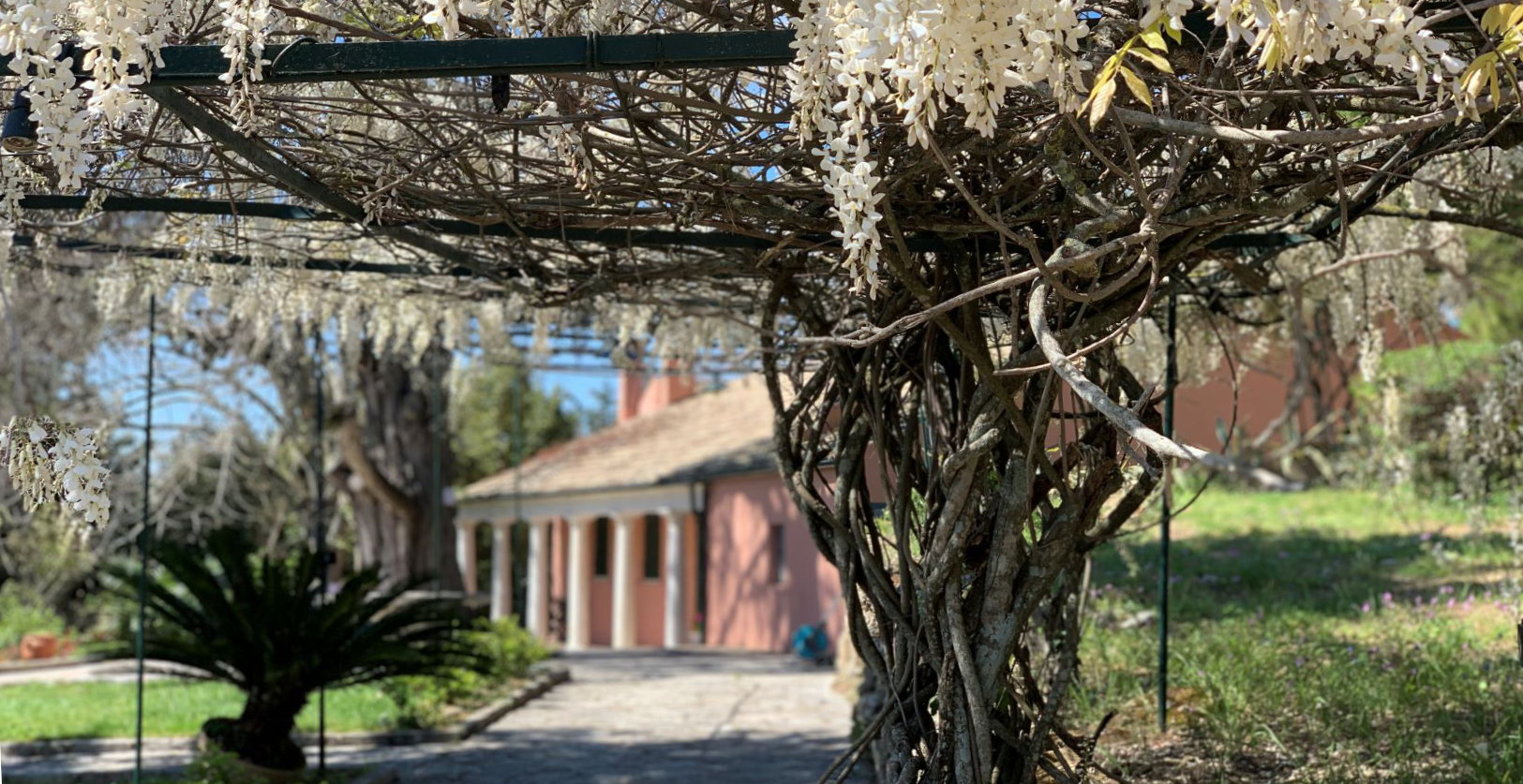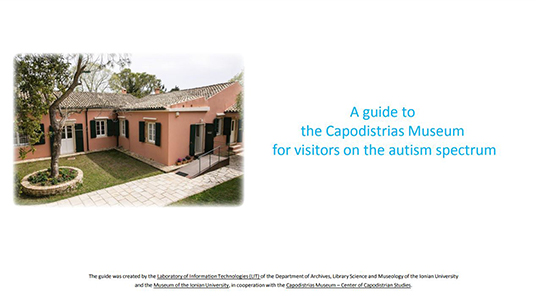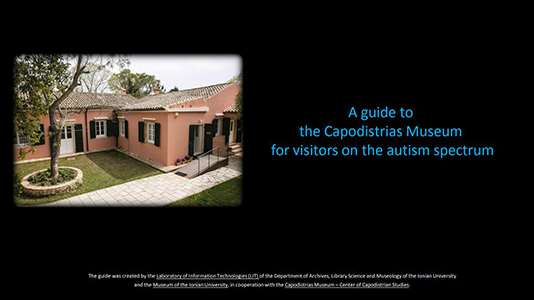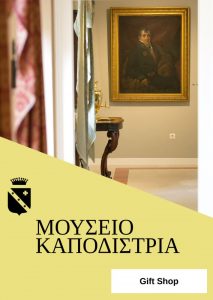
VISIT
Organise your visit to the only museum dedicated to Ioannis Capodistrias, the first governor of Greece, at the historical Capodistrias family estate of Koukouritsa.
At the Capodistrias Museum, you can explore the history of Corfu, Greece, and 19th century Europe through the life and legacy of Ioannis Capodistrias, first governor of modern Greece. The permanent exhibition, displayed in the Capodistrias family house of Koukouritsa, presents a unique collection of the Governor’s personal belongings, family memorabilia and state-related artefacts.
The museum is situated in the Capodistrias estate of Koukouritsa, a listed monument, just 7km from Corfu town, near Evropouloi village. During your visit, you can enjoy the botanical garden with splendid views and relax at the Garden Café and find original souvenirs at the Museum Shop. In the summer months, there are cultural and educational events in the museum’s garden, for the old and young.
Face masks recommended indoors.
OPENING HOURS
April – November
Open: Tuesday – Sunday, 10:00-16:00
Closed: Monday & public holidays
December – March: by appointment only
HOW TO GET HERE
Capodistrias Museum – Center of Capodistrian Studies
Koukouritsa Evropoli, Corfu
Tel: +30 26610 32440
Email: info@capodistriasmuseum.gr
BY CAR:
From the Palaiokastritsa National Road, turn off at Hospital or Potamos (depending on your direction) and then follow the signs for Evropouli/Capodistrias Museum.
The entrance to the museum is on the road.
Find us on Google Maps
BY BUS:
Urban line Νο 4, ‘Koukouritsa’ stop (departure from Sarokο Square)
For timetables, click here
EXHIBITION TICKETS
Free entry to the museum garden and café.
- Groups of 8 adults or more
- Large families
- Over 65s
- Students at institutions of higher education
- Schools for tour guides
- Holders of the International Student Identity Card (ISIC)
- Holders of the European Youth Card
- School group visit
- Free admission for accompanying educators
- Persons under 18 years of age
- Members of the International Council on Museums (ICOM) and/or the International Council on Museums and Sites (ICOMS), upon presentation of ID
- Licensed tour guides, upon presentation of ID
- Educators accompanying visits by schools or other institutions
- Journalists, upon presentation of ID
- Members of the Friends of the Capodistrias Museum Society
- People with disabilities and their companion
- Unemployed persons, upon presentation of unemployment card
FACILITIES
The museum has a free audio guide service available to all visitors via a webapp for smartphones and on a special device. The audio guide for the permanent exhibition is available in four languages (English, Russian, French, Greek).
Free activity for children under 12 visiting the permanent exhibition with their families and/or guardians.
This an educational activity to help children explore the exhibition and discover information on Ioannis Capodistrias through play.
The Capodistrias Museum is surrounded by a garden of 13,000m2, with rich flora and panoramic views. Entry to the historical garden and the museum’s open-air café is free. Signage in the garden is available in two languages (Greek, English).
Pets on a lead are allowed in the garden.
Free parking available inside the estate in two different zones:
For all private vehicles, there are places near to the estate entrance.
For people with mobility issues, there are places close to the house-museum/café.
Toilets are situated both inside the museum building and in the garden. Toilets for people with disabilities are located directly across from the entrance to the building.
The museum’s welcoming garden is available upon request for quiet private functions. If you would like to organise your own event in the garden, you can send your request, together with a description, to the museum’s email and we will reply immediately.
Photos/videos are allowed in the museum:
For visitors:
The taking of photographs by visitors to the permanent exhibition and the garden is permitted. The use of selfie sticks inside the building is not permitted for safety reasons. We would love you to share your pictures with us by using the museum’s hashtags #capodistriasmuseum, #koukouritsa and #Capodistrias on your posts.
For professional use:
Written permission is required for professional photography/video recording of the exhibition and the surrounding areas.
ACCESS FOR PEOPLE WITH DISABILITIES
The Museum’s permanent exhibition and its surrounding area is accessible for people with limited mobility and for visitors on the autism spectrum.
The Museum offers parking spaces near the building, ramps for access to the building and accessible toilets.
Download here the Capodistrias Museum Guide for visitors on the autism spectrum (choose between white or black background).
CAFE
You can enjoy a refreshment, drink or snack in this enchanting location within a cool oasis taking in the splendid view.
Visitors to Corfu and the museum can enjoy the outdoor self-service café on the hilltop of the Koukouritsa estate. The café offers cold and hot drinks, alcoholic drinks, traditional juices and light snacks with emphasis on fresh, local products.
All packaging is biodegradable, and the menu is digital, reinforcing the museum’s policy on sustainability.
The unique café kiosk was designed by Οι2τrόποι Architecture and received an award from the Greek Institute of Architecture. It was presented at the 9th Biennale of New Greek Architects in 2019 as one of the most significant modern architectural projects that is in perfect harmony with a historical monument.
MUSEUM SHOP
At the museum, you will find a selection of gifts, publications, souvenirs, accessories, and prints related to the museum’s collection, Ioannis Capodistrias, and Corfu. All gift shop proceeds support the museum’s operation and programmes.
Here, you can flick through the catalogue of the specially designed products available in the museum shop.
CORFU
Corfu is the place where count Ioannis Capodistrias was born, where he grew up and he lived the greater part of his life and where he is buried. Corfu today is home to the only museum dedicated to his life and legacy.
The island of Corfu in Greece is known as a cosmopolitan place, with visitors from all over the world and sights of international repute.
Throughout its history, it has been administered by many foreign powers, such as the Romans, Angevins, Venetians, French, Russians, and British, all of whom left their mark on the culture of the island. This variety of influences has formed the unique cultural bequest that is Corfu, visible in terms of architecture and art, local traditions, gastronomy, and dialect.
Besides the unique manmade environment, the verdant island of Corfu is blessed with unique a natural environment, beautiful beaches, and blue waters that blend surprisingly well with the picturesque villages, the historic city (UNESCO monument), the museums, the forts, the historical monuments, and the local customs.




